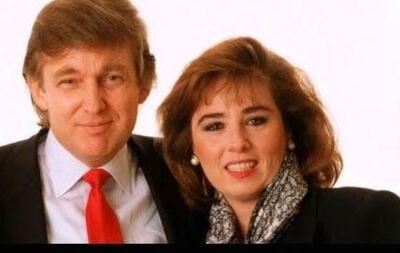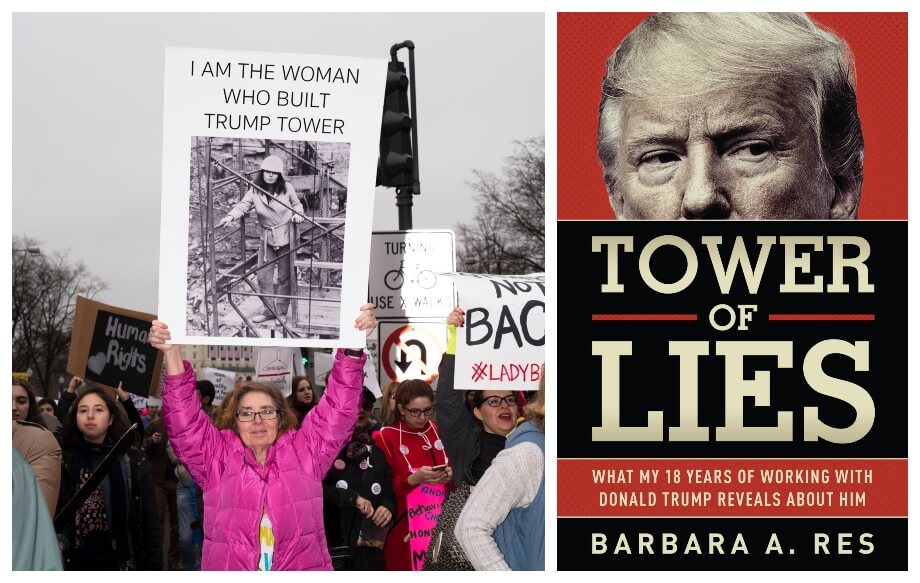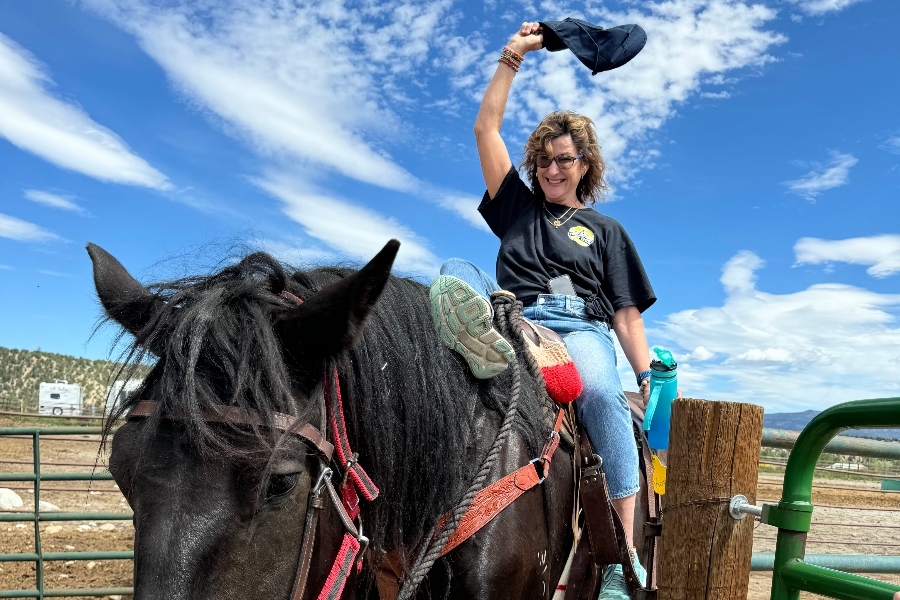On January 21, 2017—in those ancient, bucolic times when “corona” was just a beer—470,000 women poured into Washington D.C. and socially non-distanced to protest the previous day’s inauguration of Donald Trump. Horrified and disgusted by his politics and his sexism—manifested in so many ways but especially in his recorded brag to Billy Bush about his fame enabling him to grab women “by their pussies”—many marchers held clever signs. Among them: “Rise, Sister, Rise!” “Grab America Back!” “This is only Day One!” “My Pussy, My Rules,” and “Don’t Let the Bastards Grind You Down.”
But one three-and–half-foot-tall placard—lofted fiercely upward by a determined-faced woman in an iridescent hot-pink parka—was unique. “I AM THE WOMAN WHO BUILT TRUMP TOWER,” it read. Under the lettering was a photo of that woman, Barbara Res, some 30 years earlier, smiling in a hard hat: alone in the Manhattan sky, standing on a scaffolding, looking way down on the excavation.
“The Women’s March was one of the best days of my life!” Res is saying to me in a phone call the other night, her usually straightforward and low-emotion New York-accented voice suddenly euphoric. “The feeling! The camaraderie! The solidarity ! I had been to other marches, for reproductive freedom and other causes, but this was special! The attitude was: `The women are gonna do it!’” She stops to note that two years later, a women-led resurgence took the U.S. House. “So many women came up to me,” she continutes, “and said they loved it. And Rihanna got a picture of it and posted it on Instagram and it got a million hits!”
Read More: How the Women’s March Brought College Roommates Together After 23 Years
The Tower That Barbara Res Built

Res indeed had been the construction executive for Trump Tower and, during her 18 years on and off in different major capacities with the developer who was now, astonishingly, the leader of the free world, she had gotten to know him very well, seeing close up the qualities that would magnify over time.
She witnessed the bombast, the insistence on yes people, the bad business sense, the media manipulation, and, especially, his sexism and racism. She saw that he cared for nobody else but himself; even when he boasted that she’d broken the glass ceiling by being the rare female who succeeded in construction, “he was saying that because he viewed me as a reflection of him,” she now realizes.
After trying to leave the Trump Organization a couple of times, Res stopped working for Trump for good in 1998. “Trump had a lot of bad character traits, but he was not the worst boss I ever had. He had good work—his projects were good—and he treated me okay, and I felt I was making a contribution by being a woman doing that kind of work.” Plus, there weren’t many places for her to go.
But she finally had enough. What prompted her ultimate decision? “He was very disrespectful to me—he was treating me the way he treats everyone now,” she says. “So I left. I didn’t need that.” After she quit, she joined a company that constructed hotels across the U.S. and Europe.
Before the 2016 election she went to Hillary Clinton’s campaign with what she knew about his racism, but “it didn’t pan out.” So, on that January day in 2017, she was marching instead.
Fast forward to almost four years later: today. Just before the election that is, without exaggeration, the most important in all of our lifetimes—Barbara Res has published a book, Tower of Lies: What My Eighteen Years Working with Donald Trump Reveals About Him, linking incidents surrounding many business deals, construction projects, and personal events to which she was closely privy to the qualities many of us have seen in him as a president.
Starting Over, Coming Clean in Tower of Lies
Res is definitely a NextTribe woman, viewing her midlife years as time for bold change. After decades as a successful construction executive, at the age of 56 she achieved her dream of going to law school (“I loved it!”) at Rutgers University in New Jersey, where she lives. She’s a practicing attorney now, and it’s gratifying.
Part of the clean slate is giving us details and appraisals of Trump’s life we didn’t exactly know before. I had seen Res on many MSNBC and CNN shows, long before her Tower of Lies came out, and I had heard about her book through her publisher, whom I know and have worked with. So I wanted to talk to her and was lucky to get her on the phone for an exclusive digital magazine one-on-one.
Like many women our age, she is a Biden supporter. Speaking only for myself, not for Next Tribe, I feel everything in America— from life vs. death, to the safety and education and normal, happy lives for our children and grandchildren, to our suddenly and shockingly tenuous democracy— is at stake in this election. So I wanted to talk to Res.
My first question was what message she wanted to get out to voters, these few days before the election. “I want to find people who don’t think their votes will count or people who didn’t vote the last time or who don’t know who Trump is and have them come out for Biden,” she says.
Racism and the President

I also wanted to know what she’d witnessed in terms of Trump’s now well-evident racism, because, aside from the massively overwhelming issue of the mishandling of this pandemic, this has been a supremely important matter this year.
“One day he and I were walking around a construction site at lunch time,” she answers, noting it was the time laborers took a break from work. “And Trump spotted a group of black men who were leaning against a fence. He grabbed one of the assistants and told him to move the men away. He didn’t want passersby seeing them.”
She told me about another incident. “One day I was in the process of interviewing architectural students for a job as my plan clerk. I set up a meeting with one man at Trump’s office. I was on the job site. When I went across the street I found [the candidate] sitting in the lobby and I interviewed him in my office. He was a young African American man,” she reports.
“After he left I was going back to the office and someone grabbed me and said, `Donald wants to see you.’ I went to his office and he was livid. He said to me, ‘Don’t you ever do that to me again!’ I said,`What are you talking about?’ He said, `I don’t want millionaires walking into my building and seeing blacks sitting in the lobby.’” But, she adds, “Trump had no problem selling three million dollar apartment to rich African Americans.”
Read More: The Ambition Trap: How It Gets Women Like Kamala Harris and Hillary Clinton
Sexism Ruled
In Tower of Lies, Res writes that “Trump treated women as if they were property and decorations” and that, unsurprisingly, he “would criticize his female employees for their looks.” She recalls one women who Trump regularly demeaned about her weight and how “distasteful” it was. “At some point she went on a diet and lost a tremendous amount of weight. But Donald still made fun of her, saying she was really just a ‘thin version of an unattractive woman.”
She also recounted his treatment of an employee who was pregnant. Trump told Res, “I don’t want any pregnant women working here. Get rid of her.” Res objected, saying, “For god’s sake, Donald. You know you can’t fire someone for getting pregnant… It’s against the law.’” But that didn’t give him pause. She wrote, “`Just do it. Now.’…which meant the conversation was over.”
As Res and I talked of this misogyny of his, she recalls his recent rally where Trump shouted, “Suburban women! I’m going to get your husbands back to work!” This is appalling to Res, who says, “Your husbands back to work?! He wants to put us back in the fifties!”
Lewd and Crude
We all know about the “grab them by the pussy” remark Trump made to Billy Bush, which came long after Res’s tenure with him. “That shocks me; it still shocks me. How do you beat that?” Res asked, and then, instead, offered an incident that could rate as a close second that we haven’t heard before. “We had come from the city planning commission and we were in the back of the limousine with a woman whom we were making a deal with and an environmental lawyer,” Res recounts. “He was talking about why his casinos [in New Jersey] were failing. First he blamed his brother, and then he said,`I dropped the ball. I was fucking two and three women at a time.'”
Then there was something else that will sound familiar to followers of a big scandalous news story. “One day I was in Donald’s office, and he was talking about a friend of his—about this guy and his girlfriends. And then Donald said, `He likes them very young, really young.'” Implying: under-aged. “And we were all appalled, and I told Donald I didn’t think there was anything funny about that. Several years later, I learned about Jeffrey Epstein and the fact that they were friends, and it occurred to me that he was probably talking about Epstein that day.”
We can infer from another, subsequently widely publicized remark Trump made about his friend Epstein liking girls “on the young side,” that the—now legally proven—youth of the deceased Epstein’s prey was something that stuck in Trump’s mind. And it’s also been glaring, to many, that the man who has said nothing but horrendous things about Hillary Clinton, Nancy Pelosi, Kamala Harris and—the genuinely endangered—Gretchen Whitmer, governor of Michigan, among many other accomplished women, went out of his way to send well wishes to Epstein’s alleged accomplice Ghislaine Maxwell when she was arrested and jailed this past summer.
Ivanka and His Realm
Of course the affection Trump has for his daughter Ivanka hasn’t saved her from being the butt of inappropriate (to put it mildly) remarks. Res noted the repartee Trump had with Howard Stern on Stern’s Sirius radio show some years back. Stern asked Trump if he could call Ivanka “a piece of ass” and Trump agreed. We all have heard that Trump once said of Ivanka, on “The View,” that if she wasn’t his daughter he would probably be dating her. A palpably shocking remark, most would agree. “To my mind Donald sees Ivanka as another reflection of himself—something that makes him look good,” Res says.
Many people have said that Trump did not expect to win the 2016 election. Barbara Res goes further: “Not only did he not expect to win but, in my opinion, he wasn’t happy about it. But once he realized how easy it was for him to manipulate the role and all the Republican cronies, he saw what a bonanza it was to him. Not knowing anything about government, Trump seemed to think he was a king and acted like one. That attitude, along with his willingness to not follow the rules, has gotten us to where we are today.
“Now we have to do something about it.”
Read More: In This Election Especially, Woman Our Age Are a Force to be Reckoned With





















0 Comments